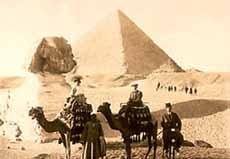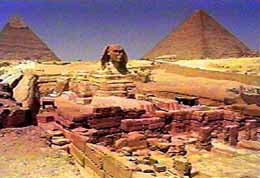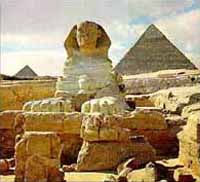Home Page
 Applying Cayce Medicine
Applying Cayce Medicine
Receive our newest Pathways to Health newsletter. Become a member of the A.R.E. Clinic's
Healing Circle!
Articles from May/June 1999:
The Egyptian Sphinx: A Mystery of Mysteries, by Scott Grady, CHt
|
|

|
 When Cayce first spoke of the Sphinx, in 1925, most of it was still buried
in sand. Archaeologists did not fully uncover the Sphinx until much later.
When Cayce first spoke of the Sphinx, in 1925, most of it was still buried
in sand. Archaeologists did not fully uncover the Sphinx until much later.
|
Phenomena
The Egyptian Sphinx:
A Mystery of Mysteries
by Scott Grady, CHt
Research & Education, A.R.E. Clinic
It was in July of 1925 that a "sleeping" Edgar Cayce first mentioned the
great Sphinx of Egypt. In a past life reading, Cayce told of how in the
past the individual receiving the reading was a man named Arsrha, and that
he was the Pharaoh Araaraart's chief jeweler and architect. It was Arsrha,
Cayce said, who laid out the design for the Sphinx and for the various
temple complexes, and he laid the design for a series of canals that
brought Nile waters to the paws of the Sphinx.
Today this psychic insight may not seem so remarkable. For now - more than
70 years later - we know that near the Sphinx there are indeed several
temples, tombs, and canals - just as Cayce had said. In fact, in recent
photos of the Giza plateau, the area is so cluttered with newly uncovered
walls and pillars that it is a little difficult at times to perceive the
Sphinx amid them.
|
 This photo, taken in 1930, shows how the shifting sands kept covering the
Sphinx, making an early exploration of the temples at its base an
impossibility.
This photo, taken in 1930, shows how the shifting sands kept covering the
Sphinx, making an early exploration of the temples at its base an
impossibility.
|
But in 1925, when Cayce first began describing the ancient temples of
Egypt, the Sphinx was little more than a head in the sand. In fact, it was
in 1925 that Emile Baraize, of France, entered into an 11-year project of
clearing the Sphinx of accumulated sand and debris. As the years passed
from 1925 to 1936, the body and base of the Sphinx slowly came to be
revealed. As you may imagine, Cayce's revelations exceeded those of the
archaeologists by leaps and bounds.
Cayce said that the Sphinx and other works were built upon the ruins of a
much earlier civilization. The face of the Sphinx, he said, is that of a
great counselor who first served the pharoah Arart, then his son,
Araaraart. Physical evidence of the existence of this counselor may be
found in a secret repository in the Sphinx, in the base below the left
forearm. Another set of records, these pertaining to the construction of
the Sphinx and the histories of the pharaohs who built it, may be found in
the base below the left hindpaw, in the corner closest to the Great Pyramid.
|
 The Sphinx, as it looks today, almost lost amid a jumble of
partially excavated ruins.
The Sphinx, as it looks today, almost lost amid a jumble of
partially excavated ruins.
|
According to Cayce, there are other ancient records hidden near the Sphinx.
Between the Sphinx and the Nile lie many tombs and temples that have yet to
be uncovered. In some of these tombs there are records and philosophical
writings. One person, named Aris-Hobeth, is said to have 32 tablets of her
writings buried with her. Other tombs may contain writings that were prized
by the deceased. Some tombs may bear artifacts from the earlier
civilization.
But the most highly sought of the ancient records buried near the Sphinx
are those associated with a "hall of records." The records here are said to
contain the history and wisdom of Atlantis. According to the readings,
duplicate copies of these records may be found in a temple in Atlantis and
in the Yucatan peninsula of Mexico.
|
 Will future archaeological expeditions discover an ancient temple complex
and an Atlantean "hall of records?"
Will future archaeological expeditions discover an ancient temple complex
and an Atlantean "hall of records?"
|
Can this be true? Certainly, some of what Cayce has said about the tombs,
temples, and canals around the Sphinx has already been proven. But the
datings that Cayce gave - going back to 10,500 BC for the building of the
Sphinx and pyramids - and all the information on records caches and past
lifetimes ... can this be true?
One investigator, John Anthony West, has shared his opinion. Following his
attendance at an ARE conference on Egypt, he said, "Since vindicating (or
disproving) Edgar Cayce is not my own chief personal concern, I'll not
elaborate on these issues beyond noting that I believe the validity of the
extensive Cayce medical readings is beyond dispute, and constitutes one of
the most remarkable and convincing records for parapsychological phenomena
ever recorded. But the issue is much cloudier when it comes to his
predictions, prophecies, past-life readings, and the massive corpus of his
Atlantis/Egypt readings."
The A.R.E. Clinic has been prominent in proving the value of the Cayce
medical readings. It will be the task of others to validate Cayce's
insights regarding the history of the world.
At the beginning of this century, inquiring minds turned to the Sphinx and
the pyramids. Now, at the end of this millennium, the Sphinx draws our
attention once again. What new mysteries will be revealed?
|
|

